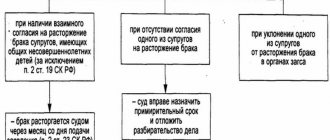Theoretically, any dispute of a civil, family or other nature can be resolved peacefully by the parties. But in practice, an insurmountable conflict between participants requires the involvement of an independent arbitrator. Every person has the right to go to court to protect his interests. The claim must be filed at the place of residence of the defendant. It is more difficult to do this if the defendant’s place of residence is unknown.
Rules of jurisdiction: where to file a claim
Rules of jurisdiction are the conditions for the territoriality of consideration of specific claims. In general cases, the procedural legislation of the Russian Federation in relation to individuals determines the privilege of defendants over plaintiffs, obliging the latter to file a claim in court at the place of residence of the former. This is necessary in order to notify the defendant of the upcoming court hearing. According to civil law, the defendant's place of residence is the address at which he permanently or primarily resides. At the same time, his status as an owner, tenant, or other grounds on which he lives there does not matter. The practice of applying the conditions of jurisdiction indicates that the place of residence is the housing in which the citizen is registered at the place of permanent residence. This is due to the fact that the place of registration is the only address that can be easily confirmed with documents, because the person himself registered there.
This does not mean that the plaintiff cannot file a claim at the place of actual residence of the defendant, even if it does not coincide with the address in the passport.
The plaintiff must indicate the defendant's address in the application. The court does not verify the accuracy of this information. Questions will arise only if it is not possible to deliver copies of court documents to the specified address, and it turns out that the address itself does not coincide with the place of registration. If the defendant is notified of the process, there will be no problem.
The legislative framework
The basis of procedural legislation, which determines the conditions for compliance with jurisdiction, is the Civil Procedure Code (CCP). According to the general rules established by Art. 28 of the Code of Civil Procedure, claims against citizens are considered at their place of residence, and against organizations - at the place of registration. The circumstances that allow the plaintiff to independently choose the court to file a claim are defined in Art. 29 Code of Civil Procedure. It also lists all the courts to which the applicant can apply. The case where the plaintiff does not have information about the defendant’s place of residence is one of these exceptions.
Watch the video instructions from Elena Shereshovets
The requirement to indicate the debtor's identifier when filing a claim in court is not currently in effect: it has been postponed until the end of 2021 in accordance with clause 20.2 of No. 166-FZ. But in the spring there was a period when the courts rejected the claims of housing and communal services organizations if there was no such identifier. The head of the expert council of the Association of Professional Real Estate Managers “P1” told how the Capital Repair Fund from the Khanty-Mansiysk Autonomous Okrug managed to overcome this issue:
➡️ Watch the video on the YouTube channel of the P1 Association
Filing a claim in the absence of the defendant's address
The only pre-trial way to find out the defendant’s place of residence is a written request to the GUVM. Another option is to submit an application to the court along with a petition to establish a place of residence. These procedures are not required. If the defendant's address is unknown, clause 1 of Art. 29 of the Code of Civil Procedure allows you to file a claim in court:
- at the location of the defendant’s property, for example, an apartment owned by him;
- at the last known address of registration or actual residence of the defendant.
This fact should be mentioned in the claim, and the relevance of the address should be confirmed with an extract from the Unified State Register, postal envelopes indicating it, or other documents. There are other cases that allow you to file claims in the courts at the applicant’s address. These are the disputes:
- to restore labor rights;
- on compensation for losses and damages;
- on consumer rights protection;
- child support proceedings.
However, the plaintiff must include in the petition the defendant's address for notice of the lawsuit.
Procedure for notifying the defendant
In accordance with Art. 113 of the Code of Civil Procedure, all participants in the process must be properly notified of the hearing. For example, the defendant is sent a summons, to which procedural documents are attached. According to clause 4, this package is sent to the address specified by the plaintiff. If the defendant does not live there, the law allows documents to be redirected to his place of employment. But in practice, the mechanism for searching for this place is not spelled out in the law, so most often the summonses are returned. In addition, if possible, information about the appointment of a case for consideration is posted on the court’s website. However, from a practical point of view, this does not always facilitate notice to the defendant.
If the defendant does not live at the specified address
As follows from Art. 116 of the Code of Civil Procedure, a subpoena must be handed to the addressee against a handwritten signature. If the courier does not find him in person, you can, with the consent of adult family members, give them a summons to hand over to the addressee.
An exception is hearings on declaring citizens incompetent, for which summonses are served only in person.
In case of temporary absence of the defendant, the courier makes a note about this and indicates where he went and when he should return. If the courier establishes that the person does not live at the specified address and his location is unknown, he will indicate on the summons the time and source from which the information was received. Then the document with a mark is returned to the court.
Are claims considered if the defendant’s address is unknown?
In cases where the location of the defendant is unknown, Art. 120 of the Code of Civil Procedure obliges the judge to put him on the wanted list, and a corresponding ruling is issued. The claims in question are:
- in defense of state, regional or municipal interests;
- for alimony payments;
- with claims for compensation for harm to life and health.
Guided by Art. 216 of the Code of Civil Procedure, the judge, on his own initiative or at the request of the plaintiff, may suspend the proceedings, although he is not obliged to do so. In other cases, according to Art. 119 of the Civil Procedure Code, upon return of the summons, the court must begin hearing the case. So, the actual absence of information about the location of the second party is not an obstacle to considering the case and making a decision.
How to avoid having to track down the defendant
Despite the absence of procedural problems with the consideration of cases without a defendant, the implementation of such decisions seems difficult. To do this, in any case, you will have to look for either him or his property. In order to initially eliminate the problem of searching for a debtor, if a person has obligations, it is recommended to obtain his identification documents confirming his registration address, place of actual residence or location of his property.
If the defendant is an organization
There are no special rules for determining jurisdiction in cases where the defendant in a claim is a legal entity. The claim is filed at its location, except for the cases specified in Art. 29 Code of Civil Procedure. The application must indicate the registration address. The lack of this information is not a problem today.
An interested person can visit the Federal Tax Service website https://egrul.nalog.ru/, enter the name of the organization and obtain information from the Unified State Register of Legal Entities indicating the OGRN, INN, KPP and place of registration of the legal entity. It is at this address that a lawsuit is being filed against the organization.
Actual and legal addresses do not match: risks for the company
The legal address of an organization is the location of its sole executive body, i.e.
leader. When registering an LLC, the tax office always very carefully checks the accuracy of the declared address: completeness and accuracy of spelling, presence of a letter of guarantee or consent of the owner of the residential premises.
In practice, it often happens that the organization is not located at the legal address stated during registration, and there is no connection with it. In this case, two options are possible:
- The LLC is registered but does not operate;
- the company actually operates, but is located at a different address - physical or postal.
The legal consequences for a legal entity in these options will be different. A non-operating organization that does not submit reports and does not conduct banking operations during the year is recognized as having actually ceased its activities (Article 21.1 of Law No. 129-FZ). Subsequently, such a legal entity may be excluded from the Unified State Register of Legal Entities at the initiative of the tax inspectorate as inactive.
If an organization operates, but there is no connection with it at its legal address, then this situation is interpreted as the presentation of false information about a legal entity. In this case, the tax office may:
- bring the manager to justice under Article 14.25 of the Code of Administrative Offenses of the Russian Federation (fine from 5 to 10 thousand rubles, and in case of repeated offense - disqualification for a period of 1 to 3 years);
- prevent the accounting of costs when calculating the tax base of the organization itself and its counterparties;
- make an entry in the Unified State Register of Legal Entities that information about the organization is unreliable;
- require the bank to terminate the bank account agreement with such an organization;
- apply to the court with a claim for forced liquidation of a legal entity.
If you are just planning to open an LLC, then use our free service, which will save your time and prepare documents for registering a company.
How do tax authorities know that the actual and legal addresses do not match?
The tax authorities do not make unannounced visits, so they find out that the actual and legal addresses of the company do not match, because the information they sent by mail is returned with the words “no addressee”, “after the expiration of the storage period”, and the like.
A signal that an organization is not located at its legal address can be received by tax authorities from other government bodies, clients or counterparties. It happens that the company itself indicates an actual address that does not coincide with the legal one in its advertising and even in reports and letters to the INFS. This, of course, should not be done.
You can provide your actual address in correspondence to your counterparties with whom you have established a trusting relationship without any problems. In the contacts of advertisements addressed to an indefinite number of persons, it is necessary to indicate the legal address, and for the actual one, add a postscript: “warehouse address” or “production address.”
Please note: If at least one stationary workplace is created at an actual address other than the legal one for a period of more than one month, it is necessary to register a separate unit.
Ideally, of course, the actual and legal addresses of the organization should match, but if you regularly receive correspondence when ordering an address with postal and secretarial services, then the risks of being held liable are minimal.
What to do if the tax inspectorate finds a discrepancy between the actual and legal addresses
After the INFS has discovered a discrepancy between the actual and legal addresses, it sends a notification to the head of the organization demanding an explanation on this issue. In this case, the notification is sent not only to the legal address from which it will most likely be returned, but also to the registered address of the director and founders of the LLC. You must respond within 30 days.
You can, of course, report that the organization is where it is supposed to be, but for some reason the letters are not being received, but if you are conducting real activities and submitting reports, then it is worth changing the legal address to a reliable one in the form P13001 or P14001. After changing the legal address, you must give an answer that the problem has been resolved, the process of moving the organization has been somewhat delayed, but now the information about the legal entity is completely reliable. Usually after this the Federal Tax Service considers the issue resolved.
https://www.youtube.com/watch?v=tlAMasYjiHY
Back in 2021, the Federal Tax Service began a large-scale cleansing of the Unified State Register of Legal Entities from shell companies. Unfortunately, bona fide organizations whose legal addresses were considered unreliable by tax authorities on formal grounds were also under attack. For example, when the address was checked, the director was not there. Currently, more than half a million organizations are on the list of suspicious organizations.
Be sure to take into account the fact that there are also risks associated with not receiving important information from the tax office. According to Article 31 of the Tax Code of the Russian Federation, registered letters sent by the tax authority by mail are considered received by the addressee on the sixth day from the date of sending. Received regardless of whether the organization is located at its legal address or not!
The taxpayer is considered officially notified, and the consequences here may be more serious than just a fine for inaccurate information about the legal address.
The tax inspectorate may send a request to provide explanations on the submitted declaration or reporting, a message about blocking the current account, a decision on bringing to tax liability, etc.
As a rule, the taxpayer is given a certain time to provide an explanation or correct the violations, so it is, of course, in your best interests to be in touch and receive official correspondence in a timely manner.
Source: https://www.regberry.ru/registraciya-ooo/fakticheskiy-i-yuridicheskiy-adres-ne-sovpadayut-riski-dlya-kompanii
Procedure for going to court
In general cases, the procedure for going to court is as follows:
- The plaintiff prepares claims, defines the requirements, and includes them in the statement of claim.
- The claim is accompanied by a package of documents substantiating the circumstances and requirements specified in the application.
- The applicant or his representative files a claim in court in compliance with the terms of jurisdiction.
- As part of preparing the case for the hearing, a summons with procedural documents is sent to the defendant, and in case of his absence, it is returned to the court.
- The judge, at a preliminary hearing, ascertains the plaintiff's opinion on this matter and sets a date for the first trial, recognizing that the defendant is considered to have been duly notified.
- The trial takes place without the participation of the defendant.
- The court makes a decision, which, after the expiration of the period for appeal, enters into legal force and can be transferred for execution to the FSSP.
During the consideration of the case, you can file a petition to transfer the case to the defendant’s place of residence. This applies to cases where his address has become known, therefore, considering the case in another court violates the rule of jurisdiction.
Filing a claim
The claim does not have a specific form or form, because its text depends on the essence of the dispute. Although the plaintiff can independently draw up a statement, going to court in any case must meet the requirements of Art. 131 Code of Civil Procedure and contain:
- the name of the court in which it is filed;
- full personal data of the plaintiff and defendant, their addresses and contacts;
- a description of the circumstances of the life situation and other facts that preceded going to court;
- an indication of the plaintiff’s rights being violated or the threat of their violation by the defendant: debt;
- unpaid alimony;
- refusal to raise a child;
- actual absence of marital relations and so on;
A sample application for alimony will help you understand what a claim should look like.
In order to comply with procedural rules, it is better to entrust the preparation of a claim to specialists.
Package of documents
The requirements for the set of documents are determined by the provisions of Art. 132 Code of Civil Procedure. The following must be attached to the claim:
- copies of the application in an amount depending on the number of parties to the case;
- receipts for payment of state duty;
- power of attorney if the claim is filed by a lawyer or other representative;
- calculation of the amount to be collected: debt, alimony, compensation for harm;
- confirmation of completion of the claim dispute resolution procedure, if required;
- evidence of the reliability of the facts specified in the application;
- documents confirming compliance with the rules of jurisdiction.
Which court should I go to?
As mentioned above, paragraph 1 of Art. 29 of the Code of Civil Procedure indicates where to file a claim if the defendant’s place of residence is unknown:
- at last known address;
- at the location of the defendant’s property, for example, real estate.
At the same time, judicial jurisdiction must be observed. Russian courts have their own hierarchy. The lowest authority in the most common cases is the magistrate's court. The list of cases considered by him is determined by Art. 23 Civil Procedure Code:
- divorce;
- cases of issuing a court order;
- simple property disputes and so on.
If the situation is not within the jurisdiction of the magistrate, the claim is filed in the district court. In the cases specified in Art. 26 of the Code of Civil Procedure, the first instance is the republican, regional, regional and other courts.
Examples of enforcement
Consideration of cases without the participation of the defendant due to lack of information about him is a common practice of Russian courts. Often this is not due to the actual lack of information, but to the concealment of current information about the location or evasion of the defendant himself. The most common examples are related to family legal relations – divorce and alimony. Let's take a closer look at them.
How to get a divorce if your husband's address is unknown
The law provides for cases when divorce is carried out through the court:
- presence of minor children together;
- objections regarding divorce from one of the spouses;
- the spouse’s avoidance of filing a joint application with the registry office.
In any of the described cases, the defendant's address may be unknown. Most often this concerns foreign spouses.
The lack of consent of the spouse, his departure from the Russian Federation or ignorance of his actual location does not prevent the divorce through the court. The initiator of the divorce may file the application at the last known address or at the location of the property. A divorce claim is allowed to be filed even at one’s own address, but only in cases where:
- the plaintiff is raising a minor;
- health status makes it difficult to attend court at the defendant’s address.
Based on the results of the consideration, within a month, the court makes a decision on divorce, on the basis of which you can obtain a certificate from the registry office. The physical presence of the second spouse is not required.
How to collect alimony if the husband’s address is unknown
In accordance with paragraph 3 of Art. 29 of the Code of Civil Procedure, claims for the collection of alimony can be filed in court at the choice of the plaintiff: at his own address or at the address of the second parent. Lack of information about his whereabouts is not an obstacle.
Let us recall an important feature of alimony claims: if the address of the alimony provider is unknown, the court is obliged to put the person on the wanted list. During this time, the consideration of the case may be suspended.
From a practical point of view, this is not necessary - the absence of a second parent does not create problems when assigning child support. After the decision is made, the plaintiff sends a writ of execution or court order to the FSSP. From now on, the bailiffs will begin searching for the debtor. They have effective tools for this.
How to file for divorce with mutual consent of the spouses, but one of them lives in another city
It happens that spouses want to divorce and do not have common children under 18 years of age, but one of the parties cannot be present when filing the application. Let's consider how to carry out a divorce in this case when spouses live in different cities.
In order for a divorce to become possible, a spouse who cannot personally visit the registry office must formalize his consent to terminate the marriage in a separate application. Such a document is notarized and can then be sent by mail to the second spouse, who will go to the registry office to write an application for divorce. The divorce process for people living in different regions will not take much time. After one month, the separating husband and wife will receive a divorce, even if the spouses are in different cities. If the absent party, along with a certified statement, also sends a power of attorney to receive a divorce certificate, then the ex-spouse will be able to receive it and send it to the addressee by registered mail.









